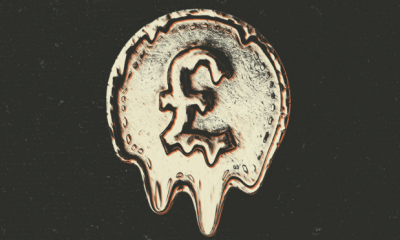British Pound Faces a Two-year Low as “Back Door Johnson” Prepares UK for “No Deal Brexit”

‘Back door Boris’ – the latest nickname for the UK Prime Minister, who can add it to a long line of other derogatory titles he has received over the years. The term was coined after Boris Johnson decided to exit the residence of the Scottish First Minister Nicola Sturgeon yesterday via the back door, in order to avoid the booing protestors who had gathered outside to demonstrate against his visit.
Johnson, who only became PM last week, made Scotland one of his first priorities on becoming leader, travelling north to meet with his Scottish counterpart in Bute House on Monday and pledging a £300 million money pot for communities in Scotland, Wales and Northern Ireland. Such a sweetener however may be too little too late however for the Scottish people, as not only is the new PM deeply unpopular north of the border, but all statistical evidence to date points to his leadership only boosting the Scottish independence movement.
In what was described as a ‘lively discussion’ by Nicola Sturgeon, the pair are reported to have debated the future of the Union. Sturgeon says that she proposed they have the debate in public, and even on television, ‘at which point his advisor said it was probably time we left’.
The First Minister also commented that from their conversation she had ascertained that despite public denials, the Johnson government is actively pursuing a No Deal strategy for Brexit – by which the UK leaves the European Union on 31st October without any agreement in place, and begins to trade according to World Trade Organisation rules. She added that this path was a ‘dangerous one for Scotland and the UK’.
Her fears are valid. On Tuesday the pound slumped to a 28-month low as investors reacted with alarm to the Johnson government No Deal rhetoric. Leading business groups have voiced concern that a lack of information on a No Deal scenario was hampering preparations. At the weekend the Confederation of British Industry warned that Britain was ill-equipped for a such a Brexit, whilst the Federation of Small Businesses described the lack of preparation as ‘frightening’.
And yet, despite Johnson assuring the public that ‘we can get a new deal’, the cabinet lead for No Deal preparations, Chancellor of the Duchy of Lancaster Michael Gove, has said the opposite:
‘We must assume that there will be a No Deal Brexit on 31st October.’
When considering the many failed attempts by Theresa May to get a deal passed by Parliament, and given Johnson’s own demand that the EU would have to agree to scrap the Irish backstop if negotiations were to resume, Gove’s prediction is looking to more likely one at this stage.
And yet such a scenario will only exacerbate the anti-Johnson feeling north of the border. Coupled with this is the lack of agreement with the Scottish Conservative party leader, Ruth Davidson, who not only is against a No Deal Brexit, but who also came to clashes with Johnson over the future of David Mundell as Scottish Secretary.
Despite Davidson’s plea that Mundell remain in his position, Johnson paid no heed and replaced him in what has been termed a ‘cull’ of the cabinet. The snub exposes the deep rift between Johnson and Davidson, who has been highly critical of him in the past and is a further sign that not only is he rejected by Nationalist supporters, but fails to have generate support from the Scottish branch of his own party.
But despite sowing such discord north of the border, Boris Johnson has done nothing to dispel the perception in Scotland that he is a privileged, Eton-educated ‘toff’ who has nothing in common with the average working Scot. In contrast he seems to be trying his best to maintain this negative image.
‘Boris Johnson doesn’t care about Scotland – he’s pushing it away’ writes Martin Kettle in The Guardian as he suggests that he is at the head of a movement which not only doesn’t care about Scotland, but doesn’t care if Brexit breaks up the United Kingdom.
Indeed A YouGov poll from just over a month ago supports this. It revealed that around two thirds of Conservative party members – the same people who have elected Boris Johnson to PM – want Brexit to happen, come what may. That means they would see damage to the economy, a Tory party in tatters and a dis-United Kingdom, all for Brexit.
Instead of challenging his image in Scotland, and addressing people in the streets, Boris Johnson chose to dodge his critics, escaping through the back door of Bute House like a fugitive. When asked why it was he hadn’t taken the time to meet with locals during his visit he stated his schedule was ‘too busy’. And yet, if he had any real intention of influencing public opinion over him, then he would have found the time between his visits to Bute House and the Faslane Naval Base.
Instead, what is fundamentally a losing strategy has completely played into the hands of the Nationalist movement, which has long argued that Westminister government is one detached from the needs and wants of the Scottish people. Based on Johnson’s performance so far, one would be hard pushed to argue with that. Indeed if he keeps going at this rate, the history books will record him as having had a significant role to play in the dismemberment of the United Kingdom.
*
Note to readers: please click the share buttons above or below. Forward this article to your email lists. Crosspost on your blog site, internet forums. etc.
This article was originally published on InfoBrics.

